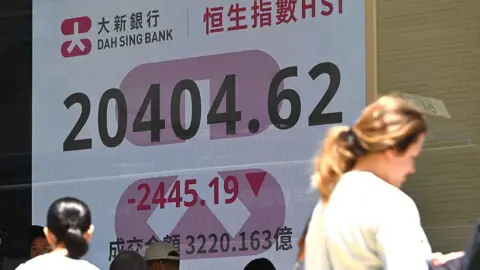Asian stocks see their worst drop in decades after Trump tariffs
 Getty Images
Getty ImagesAsia-Pacific stocks from Shanghai to Tokyo and Sydney to Hong Kong plunged on Monday by levels not seen in decades, as global markets continue to reel from US President Donald Trump's tariffs.
The Shanghai Composite was down more than 8% at one point, Hong Kong's Hang Seng dropped more than 13% and Japan's Nikkei 225 closed down by 7.8% - moves that one analyst described to the BBC as a "bloodbath".
European markets too fell in early trading, with banks and defence firms seeing the biggest drops. This follows global slumps last week after Trump announced new tariffs between 10% and 46% on most countries.
This is a blow for Asia's manufacturing hubs that count the US as a key market for exports ranging from clothes to cars.
These include wealthy allies like Japan and South Korea, which face 26% tariffs, as well as developing countries like Vietnam that are bracing for a 46% levy - Trump called the fast-growing economy one of the "worst offenders".
Also on that unenviable list are Cambodia (49%), Thailand (36%) and China, which will face 54% tariffs in total.
Others like Singapore, New Zealand and Australia have already had a so-called baseline 10% tariff go into effect.
"Asia is bearing the brunt of the US tariff hike. While there could be some room for negotiation, a new regime of higher tariffs is here to stay," Qian Wang, Asia Pacific chief economist at investment firm Vanguard.
Asian economies are also particularly sensitive to fears that a global trade war could trigger a slowdown or even a recession in the US, the world's biggest economy. That, in turn, would further hurt Asian exports.
Slumps in mainland China, Hong Kong and Taiwan were exacerbated as investors caught up with the big falls seen in other markets on Friday as they were closed for public holidays.
The Shanghai Composite closed 7.3% lower and Taiwan Weighted Index lost 9.7% - its biggest drop on record.
The ASX 200 in Australia lost 4.2% and the Kospi in South Korea ended 5.6% lower.
The Hang Seng closed at 13.22%, its biggest drop since 2008.
"Tariffs are feeding into expectations around inflation and a recession," said Julia Lee, head of client coverage at FTSE Russell, a subsidiary of the London Stock Exchange Group.
Goldman Sachs now forecasts there is a 45% chance the US will fall into recession in the next 12 months - up from a previous estimate of 35% - as the investment banking giant lowered its economic growth forecast for the country.
Other Wall Street firms have also revised their recession forecasts in the wake of Trump's tariff announcement. JPMorgan now sees a 60% chance of a US and global economic downturn.
"This is negative to the global and Asia economy, especially those small open economies, both in the short term and long-term."
Countries from Vietnam to Bangladesh have become highly reliant on the US as an export market.
Several major US brands produce goods in Vietnam, including Nike and Gap.
Bangladesh exports $8.4bn (£6.5bn) of garments a year to the US, according to the trade body, Bangladesh Garment Manufacturers and Exporters Association.
So Trump's announcement last week of a 37% tariff on Bangladesh is bad news for the South Asian nation.
"Asia is likely to feel a disproportionate brunt of this turmoil because Asia sends more exports to the US than to other markets," said Frank Lavin, former undersecretary for international trade at the US Department of Commerce.
Asia's biggest economy, China, has also hit back with its own tariffs, deepening the global stock market turmoil on Friday.
All three major US stock indexes in fell by more than 5%, with the S&P 500 dropping almost 6%, capping the worst week for the US stock market since 2020.
In the UK, the FTSE 100 plunged almost 5% - its steepest fall in five years, while exchanges in Germany and France faced similar declines.
Ms Lee also highlighted that the global stock market rout looks set to continue: "US futures trading lower point to another hard session on Wall Street tonight."
Global stock markets have lost trillions in value since Trump announced sweeping new 10% import taxes on goods from every country, with products from dozens of countries, including key trading partners such as China, the European Union and Vietnam, facing far higher rates.
Additional reporting by Annabelle Liang
